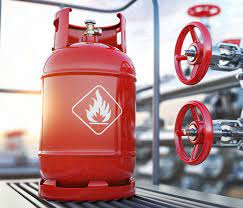Herein this post, the NLNG announced that LPG (cooking gas) production has hit 1.5 million tons and has begun sale in naira.
The Nigeria Liquefied Natural Gas Limited (NLNG), on Wednesday, announced that its annual production of Liquefied Petroleum Gas, popularly called cooking gas, has increased to over 1.5 million metric tons.
It also announced that the whole 1.5million tons production was being sold in Nigeria, adding that the company had started supplying LPG in naira, as against the usual sale of gas in the United States dollars.
Operators in the oil and power sectors have repeatedly advocated the sale of LPG or Liquefied Natural Gas in naira, especially since the crash of the local currency against the dollar.
Speaking at a panel session during the ongoing 7th Nigeria International Energy Summit in Abuja, the General Manager, Finance, NLNG Limited, Fatima Adanan, said the multi-billion-dollar firm had ramped up its LPG production to 1.5 million metric tons and was supplying all of it to the Nigerian market. She said the “NLNG is selling LPG in naira,” to deepen cooking gas penetration across the country.
READ: NIGERIA LNG LIMITED (NLNG) – ENERGY COMPANY
She added, “When we started, we were producing 70,000MT, today we are producing upwards of 1.5million MT of LPG and for this LPG, our sole designated distribution point is Nigeria. So, part of our vision as a company is to make sure that we make Nigeria a better place.
She, however, noted that Nigeria required a lot more and so cooking gas importation had been ongoing.
“But as NLNG we will work harder to provide more LPG in such a way that the people who are using charcoal and biomass to cook, we have a trajectory that in the next two, three years we should have at least 40 per cent penetration by changing the energy mix in Nigeria from coal, biomass to using gas, which is cleaner.
“In the long run, that will address some of the climate goals. Our intention may not be to alleviate the climate goals, rather to make Nigeria better. But in doing that we are going to also impact the climate goals which is important,” Adanan stated.
READ: How to apply Gas or LPG Permits & Licenses Online
Reacting to the remarks by Adanan, the immediate past Chief Executive of the NLNG, who anchored the panel session, Tony Attah, described the 1.5million metric tons LPG production by the firm as a worthy milestone.
He, however, revealed that studies showed that Nigeria required about five million metric tons annually, adding that the balance was being completed through LPG imports.
NLNG shareholders include the Nigerian National Petroleum Company Limited, which represents the Federal Government and holds the largest shareholding at 49 per cent; while Shell Gas B.V., a subsidiary of Shell Plc, holds 25.6 per cent.
Total Energies Gaz & Electricité Holdings owns 15 per cent of the shares, while Eni International holds the remaining 10.4 per cent.
This ownership structure is unique in the Nigerian oil and gas industry, as NLNG is an independent incorporated joint venture. This means that it has its own board of directors and management team, separate from the individual shareholders.
Speaking further on what the multi-billion-dollar company was doing to ensure cooking gas penetration, Adanan said, “What NLNG has committed to do is to make LPG available in-country.
“So even though our requirement in Nigeria is much larger than what we are producing at the moment, the NLNG is growing and as we grow, we will be able to produce more and make it available for utilization by Nigerians.”
She called for the education of women on the use of gas and urged the Federal Government to champion this, adding that such campaign would enable more rural women to move away from charcoal and biomass.
On concerns about the high cost of cooking gas, the NLNG official explained that though the cost of the commodity produced by the plant was cheaper, a larger percentage of the product was being imported by marketers at higher rates.
This, according to her, might be reason for the high cost of cooking gas, because marketers would price the product based on the cost of the imported one, particularly since NLNG supplies its 1.5million metric tons to marketers and not directly to end users.
Fatimah, however, stated that the company was working out ways to get its product to users on the street, though this could take some time to manifest.

